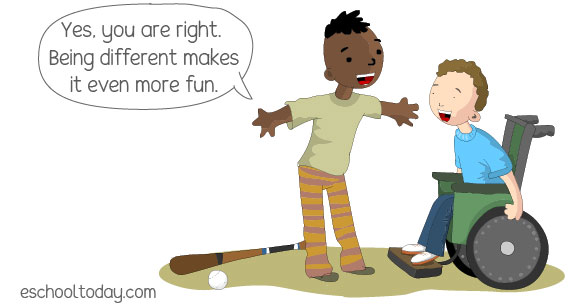- Discrimination and Prejudice
Introduction to Discrimination
Have you been to a busy city center where there are lots and lots of people? You will notice that no two people are the same. There are religious people, non-religious people, tall, short, people with long hair, others with short hair, women, men, young girls, young boys, older people, babies in strollers, people with dogs, hoods, short skirts, tight dresses, suits, people with different skin colors, speaking different languages and so on. Some people have some disability whiles others do not have any disability. We are all VERY different.

But looking carefully, all these different people have many things in common. We all eat, drink, and have feelings. Many of us have families and loved ones, and we all breathe the same air.
We are one people, and no one is more human than the other. These differences and similarities are the basis of social groups. Each person is connected to some kind of group, even though some may not be aware of it. Very likely, you share a language, culture, family, belief, or custom with some other people. As a result, you sometimes use ‘Us’ or ‘Them’ to isolate yourself from another group of people. The moment one begins to have stronger ideas or feelings about ‘Them’ and ‘Us’ prejudice sets in.
Prejudice is when you have formed an opinion about something even before you know the real story. Prejudice makes us treat people differently. For example, if a ‘normal’ kid goes into a singing competition with the child of a music superstar, people will immediately think that the child of the superstar will win. Why? Prejudice can also be well-intended. For example, ‘Black people are great at basketball”.
When prejudice gets stronger it develops into a stereotype. A stereotype is a very distorted view or idea about something. For example, pink is for girls, or basketball is for tall people. A stereotype is learned at a very early age, and children grow to have very strong ideas or opinions about things, groups, or ideologies. As children grow up, the lines of like and hate for other things, people, cultures, beliefs, languages become sharper. At this point, discrimination is ripe.
DID YOU KNOW...
Institutional discrimination:
You should also be aware that organizations can also discriminate through their processes; this is commonly known as institutional discrimination. Organizations can also be held accountable for their actions under the Equality Act 2010.
— Source: Warwickshire County Council, Dealing with Discrimination – A Parent’s Guide
